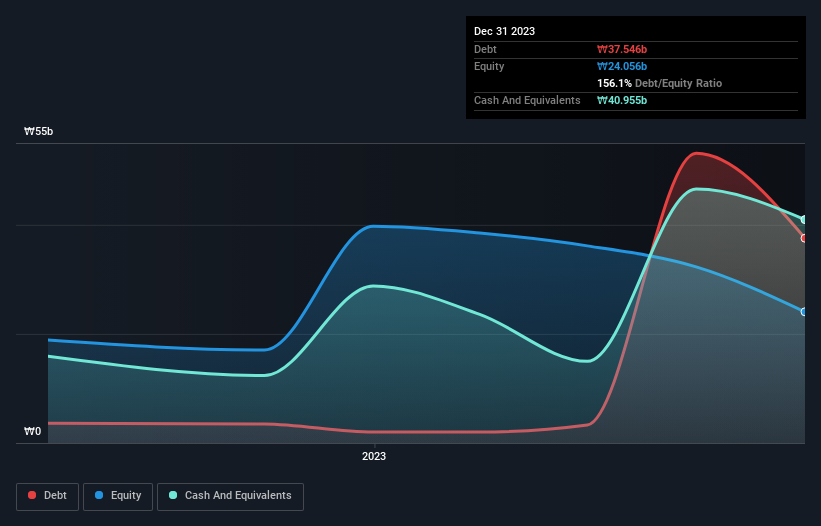The external fund manager backed by Berkshire Hathaway's Charlie Munger, Li Lu, makes no bones about it when he says 'The biggest investment risk is not the volatility of prices, but whether you will suffer a permanent loss of capital.' So it might be obvious that you need to consider debt, when you think about how risky any given stock is, because too much debt can sink a company. We note that Neuromeka Co., Ltd. (KOSDAQ:348340) does have debt on its balance sheet. But should shareholders be worried about its use of debt?
Why Does Debt Bring Risk?
Debt is a tool to help businesses grow, but if a business is incapable of paying off its lenders, then it exists at their mercy. In the worst case scenario, a company can go bankrupt if it cannot pay its creditors. However, a more common (but still painful) scenario is that it has to raise new equity capital at a low price, thus permanently diluting shareholders. Of course, plenty of companies use debt to fund growth, without any negative consequences. When we think about a company's use of debt, we first look at cash and debt together.
Check out our latest analysis for Neuromeka
What Is Neuromeka's Debt?
The image below, which you can click on for greater detail, shows that at December 2023 Neuromeka had debt of ₩37.5b, up from ₩2.00b in one year. However, its balance sheet shows it holds ₩41.0b in cash, so it actually has ₩3.41b net cash.

How Healthy Is Neuromeka's Balance Sheet?
We can see from the most recent balance sheet that Neuromeka had liabilities of ₩50.8b falling due within a year, and liabilities of ₩20.9b due beyond that. Offsetting these obligations, it had cash of ₩41.0b as well as receivables valued at ₩7.53b due within 12 months. So its liabilities total ₩23.2b more than the combination of its cash and short-term receivables.
Since publicly traded Neuromeka shares are worth a total of ₩330.7b, it seems unlikely that this level of liabilities would be a major threat. But there are sufficient liabilities that we would certainly recommend shareholders continue to monitor the balance sheet, going forward. Despite its noteworthy liabilities, Neuromeka boasts net cash, so it's fair to say it does not have a heavy debt load! There's no doubt that we learn most about debt from the balance sheet. But it is Neuromeka's earnings that will influence how the balance sheet holds up in the future. So if you're keen to discover more about its earnings, it might be worth checking out this graph of its long term earnings trend.
In the last year Neuromeka wasn't profitable at an EBIT level, but managed to grow its revenue by 41%, to ₩14b. Shareholders probably have their fingers crossed that it can grow its way to profits.
So How Risky Is Neuromeka?
Statistically speaking companies that lose money are riskier than those that make money. And we do note that Neuromeka had an earnings before interest and tax (EBIT) loss, over the last year. Indeed, in that time it burnt through ₩43b of cash and made a loss of ₩18b. With only ₩3.41b on the balance sheet, it would appear that its going to need to raise capital again soon. With very solid revenue growth in the last year, Neuromeka may be on a path to profitability. Pre-profit companies are often risky, but they can also offer great rewards. When analysing debt levels, the balance sheet is the obvious place to start. But ultimately, every company can contain risks that exist outside of the balance sheet. These risks can be hard to spot. Every company has them, and we've spotted 1 warning sign for Neuromeka you should know about.
When all is said and done, sometimes its easier to focus on companies that don't even need debt. Readers can access a list of growth stocks with zero net debt 100% free, right now.
Valuation is complex, but we're here to simplify it.
Discover if Neuromeka might be undervalued or overvalued with our detailed analysis, featuring fair value estimates, potential risks, dividends, insider trades, and its financial condition.
Access Free AnalysisHave feedback on this article? Concerned about the content? Get in touch with us directly. Alternatively, email editorial-team (at) simplywallst.com.
This article by Simply Wall St is general in nature. We provide commentary based on historical data and analyst forecasts only using an unbiased methodology and our articles are not intended to be financial advice. It does not constitute a recommendation to buy or sell any stock, and does not take account of your objectives, or your financial situation. We aim to bring you long-term focused analysis driven by fundamental data. Note that our analysis may not factor in the latest price-sensitive company announcements or qualitative material. Simply Wall St has no position in any stocks mentioned.
About KOSDAQ:A348340
Very low risk with worrying balance sheet.
Market Insights
Community Narratives




